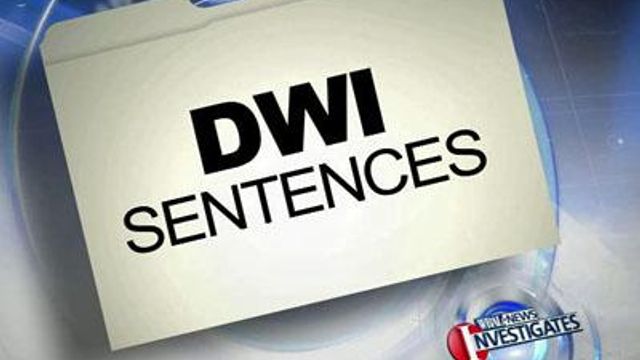WRAL Investigates: Do DWI punishments fit the crime?
Unlike people convicted of misdemeanors like resisting an officer, simple drug possession or communicating threats, people convicted of drunken driving in North Carolina often don't spend their entire sentence behind bars.
Posted — UpdatedWhen the state implemented structured sentencing in 1994, the law stated that all misdemeanor and felony sentences would be carried out in full, except for misdemeanor driving while impaired.
Sentences for misdemeanor DWI range from probation to two years in prison, but under the law, most sentences are cut in half the second a convicted drunken driver goes to prison.
A WRAL News investigation tracked all 141 DWI offenders who were released last year in Wake County. Records show they served just 36 percent of their actual sentences. More than half of those offenders had multiple DWIs.
For example, Michael D. Hall was sent to prison for his ninth DWI, but despite his record and a two-year sentence issued by the judge, he walked out of prison after 10 months.
Last year, 363 people died in drunken-driving related crashes in North Carolina. One of those crashes killed 17-year-old Laura Fortenberry of Gaston County.
At the time of the crash, the suspect, Howard Pasour, 29, had two pending DWI charges. He has since been convicted on those previous misdemeanor charges and sentenced to a total of three years in prison, but state Department of Correction records show he's up for release four months early.
The Fortenberry case caught the attention of state Rep. Tim Moore, R-Cleveland, who said “we are not going to tolerate this.”
“This fellow that killed her had multiple prior offenses and, frankly, should have been in prison,” Moore said.
On Tuesday, Moore introduced legislation to stiffen the penalties for DWIs, especially for repeat offenders.
John McWilliam, a prominent DWI defense attorney in Raleigh, said he doesn’t think it’s a good idea to put people in jail longer.
“People are already scared enough about punishments,” he said.
McWilliam represented Michael Eason, the focus of a previous WRAL News investigation after Eason racked up three DWIs in less than a year. Instead of changing the law, McWilliam said, there's already an option to make sure time sentenced is time served.
“The judge can actually sort of change that cut-in-half business by announcing a minimum sentence,” McWilliam said.
This year, the push to get tough on drunken drivers may come down to a debate between public safety and money.
“The legislature is talking about cutting programs, cutting this, cutting that. Well, if you make a decision to lock up misdemeanants for as long as you’re locking up felons, something's got to give at some point,” said defense attorney Jim Crouch.
With the support of Fortenberry's family, Moore said he knows which side of the debate he'll fall on.
Another drunken driving issue that could get a lot of attention this legislative session is those offenders who drive despite having their licenses revoked. One national study estimated as many as 75 percent drive even though they're not supposed to.
There will be a push to expand the ignition interlock program to keep offenders from driving their own cars.
• Credits
Copyright 2024 by Capitol Broadcasting Company. All rights reserved. This material may not be published, broadcast, rewritten or redistributed.






